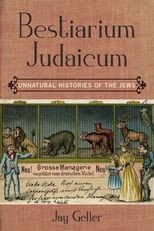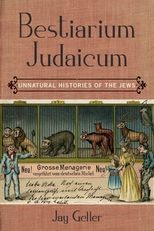Bestiarium Judaicum: Unnatural Histories of the Jews
Bestiarium Judaicum: Unnatural Histories of the Jews
Cite
Abstract
Given the vast inventory of verbal and visual images of nonhuman animals (pigs, dogs, vermin, rodents, apes, etc.) disseminated for millennia to debase and bestialize Jews (the Bestiarium Judaicum), this work asks: What is at play when Jewish-identified writers employ such figures in their narratives and poems? Bringing together Jewish cultural studies (examining how Jews have negotiated Jew-Gentile difference) and critical animal studies (analyzing the functions served by asserting human-animal difference), this monograph focuses on the writings of primarily Germanophone authors, including Sigmund Freud, Heinrich Heine, Franz Kafka, Gertrud Kolmar, H. Leivick, Felix Salten, and Curt Siodmak. It ferrets out of their nonhuman-animal constructions their responses to the bestial answers upon which the Jewish and animal questions converged and by which varieties of the species “Jew” were depicted. Along with close textual analysis, it examines both personal and social contexts of each work. It explores how several writers attempted to subvert the identification of the Jew-animal by rendering indeterminable the human-animal “Great Divide” being played out on actual Jewish bodies and in Jewish-Gentile relations as well as how others endeavored to work-through identifications with those bestial figures differently: e.g., Salten’s Bambi novels posed the question of “whether a doe is sometimes just a female deer,” while Freud, in his case studies, manifestly disaggregated Jews and animals even as he, perhaps, animalized the human. This work also critically engages new-historical (M. Schmidt), postcolonial (J. Butler and J. Hanssen), and continental philosophic (G. Agamben) appropriations of the conjunction of Jew and animal.
-
Front Matter
-
Introduction: A Field Guide to the Bestiarium Judaicum
-
1
“O beastly Jews”: A Brief History of an (Un)Natural History
-
2
Name That Varmint: From Gregor to Josephine
-
3
(Con)Versions of Cats and Mice and Other Mouse Traps
-
4
“If you could see her through my eyes …”: Semitic Simiantics
-
5
Italian Lizards and Literary Politics I: Carrying the Torch and Getting Singed
-
6
Italian Lizards and Literary Politics II: Deer I Say It
-
7
The Raw and the Cooked in the Old/New World, or Talk to the Animals
-
8
Dogged by Destiny: “Lupus est homo homini, non homo, quom quails sit non navit”
-
Afterword “It’s clear as the light of day”: The Shoah and the Human /Animal Great Divide
-
End Matter
Sign in
Personal account
- Sign in with email/username & password
- Get email alerts
- Save searches
- Purchase content
- Activate your purchase/trial code
Institutional access
-
Sign in through your institution
- Sign in with a library card Sign in with username/password Recommend to your librarian
Institutional account management
Sign in as administratorPurchase
Our books are available by subscription or purchase to libraries and institutions.
Purchasing information| Month: | Total Views: |
|---|---|
| November 2022 | 1 |
| November 2022 | 2 |
| November 2022 | 2 |
| January 2023 | 1 |
| April 2023 | 2 |
| April 2023 | 1 |
| April 2023 | 1 |
| May 2023 | 3 |
| May 2023 | 4 |
| May 2023 | 2 |
| May 2023 | 2 |
| May 2023 | 1 |
| June 2023 | 1 |
| August 2023 | 2 |
| August 2023 | 1 |
| September 2023 | 1 |
| December 2023 | 1 |
| April 2024 | 3 |




Get help with access
Institutional access
Access to content on Oxford Academic is often provided through institutional subscriptions and purchases. If you are a member of an institution with an active account, you may be able to access content in one of the following ways:
IP based access
Typically, access is provided across an institutional network to a range of IP addresses. This authentication occurs automatically, and it is not possible to sign out of an IP authenticated account.
Sign in through your institution
Choose this option to get remote access when outside your institution. Shibboleth/Open Athens technology is used to provide single sign-on between your institution’s website and Oxford Academic.
If your institution is not listed or you cannot sign in to your institution’s website, please contact your librarian or administrator.
Sign in with a library card
Enter your library card number to sign in. If you cannot sign in, please contact your librarian.
Society Members
Society member access to a journal is achieved in one of the following ways:
Sign in through society site
Many societies offer single sign-on between the society website and Oxford Academic. If you see ‘Sign in through society site’ in the sign in pane within a journal:
If you do not have a society account or have forgotten your username or password, please contact your society.
Sign in using a personal account
Some societies use Oxford Academic personal accounts to provide access to their members. See below.
Personal account
A personal account can be used to get email alerts, save searches, purchase content, and activate subscriptions.
Some societies use Oxford Academic personal accounts to provide access to their members.
Viewing your signed in accounts
Click the account icon in the top right to:
Signed in but can't access content
Oxford Academic is home to a wide variety of products. The institutional subscription may not cover the content that you are trying to access. If you believe you should have access to that content, please contact your librarian.
Institutional account management
For librarians and administrators, your personal account also provides access to institutional account management. Here you will find options to view and activate subscriptions, manage institutional settings and access options, access usage statistics, and more.